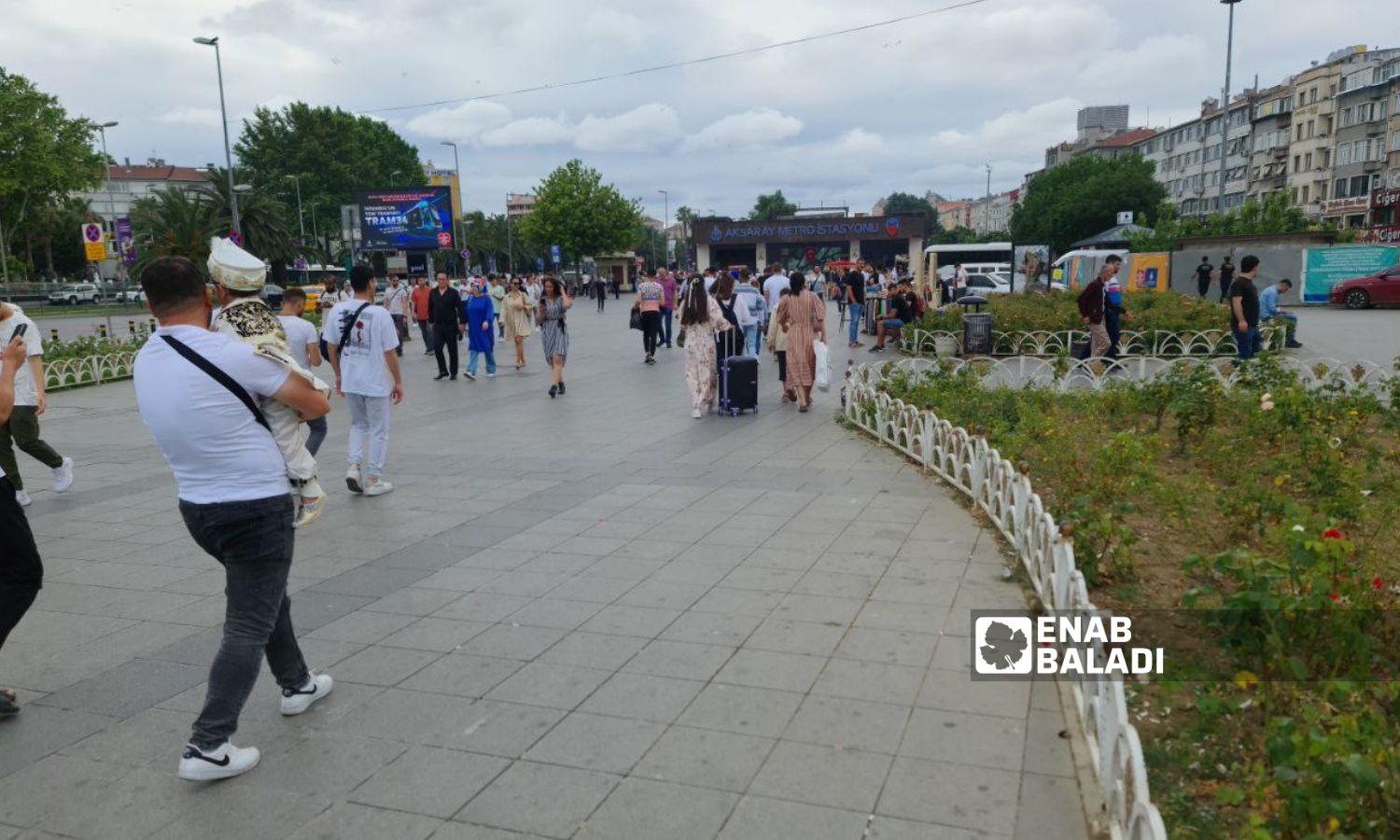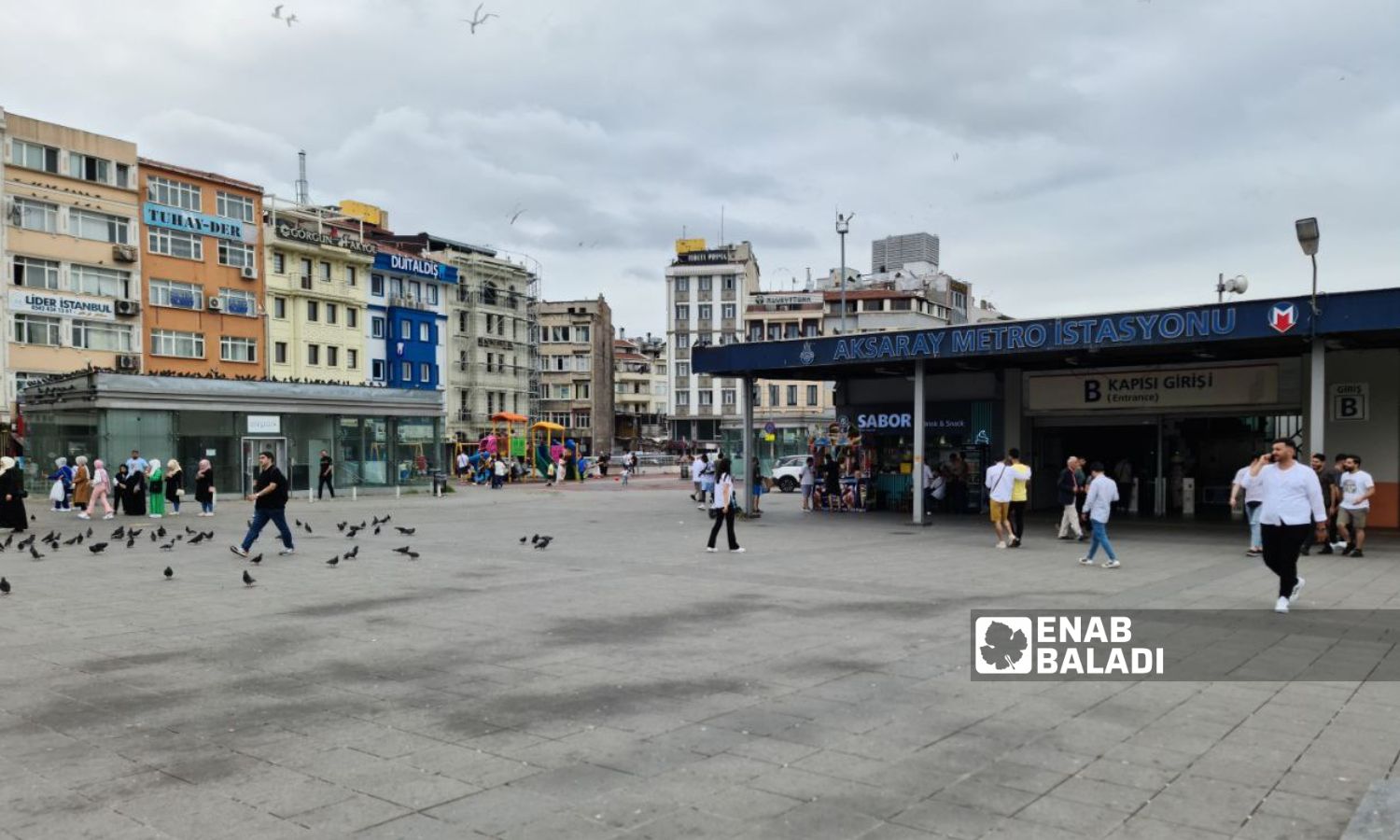



Enab Baladi – Khaled al-Jeratli
Aksaray Square in the center of Istanbul is considered one of the most vital points in the densely-populated city with refugees, and due to the concentration of the Arab market in the Fatih district, most Syrians are forced to pass through the famous square.
The word “Meydan” (square) in the Turkish language carries the same meaning in the Arabic language, and it is applied to many places in the neighborhoods of Istanbul, including what is more famous than Aksaray Square, such as the square of the Sultan Ahmed Mosque but Aksaray Square is gaining special fame due to the daily deportations that Syrians living in the city encounter.
The same situation applies to the square located in the middle of the Esenyurt neighborhood, west of the city, in which a large number of Syrian refugees reside due to the low house rent prices, but passing through its square is an adventure for some of them.
While walking in the square of the Aksaray neighborhood, in the middle of which is a large metro station, one can notice a small room in front of which there are police officers who are too many to fit in that room.
In addition to the officers, there is a medium-sized bus that can accommodate more than 20 people. You rarely notice this bus empty, as its seats are always occupied by foreigners, mostly Syrians and sometimes Afghans.
Ismail, 27, lives close to the square with a group of his friends. He spent two years of his stay in Istanbul entering the Aksaray metro station without being noticed by the police stationed in the area.
Ismail told Enab Baladi that more than a year ago he was able to obtain a permit to work in the state of Istanbul, according to which he transferred his place of residence to the city after a long struggle so that his legal status there became normal, after two years he spent trying to avoid police patrols in the squares and alleys.
In mid-2022, a police officer stopped Ismail while he was on his way to buy his belongings near the square, and because he did not have a travel permit, he was put on the bus along with other Syrians who were waiting for the number of passengers to be completed to be transferred to the deportation center in Urfa.
Because he possesses a temporary protection card issued by the state of Gaziantep, Ismail was not deported, unlike those who accompanied him on the trip who did not have a Kimlik, as he was released near the Bab al-Salama crossing in the city of Kilis near Gaziantep, with a fine.
The bus continued on its way to transport the Syrians who did not have identity papers to the crossing.
|
When I pass by the bus, the first thing that comes to my mind is, do the passengers have a Kimlik? Ismail – A Syrian refugee based in Turkey |
The same situation faced Abdullah, who was arrested by the police in the same area, and sent to the Tuzla deportation center, because he forgot his identity card at home, as the police refused to give him ten minutes to allow someone from his family to bring his Kimlik from the house.
From the Tuzla center, the responsible officer understood that Abdullah’s situation was legal, and he was released after he was subjected to verbal insults, he told Enab Baladi.

Aksaray Square in the center of Istanbul is considered one of the most vital points in the densely-populated city with refugees, and due to the concentration of the Arab market in the Fatih district, most Syrians are forced to pass through the famous square – June 29, 2023 (Enab Baladi)
The situation in the square of the Esenyurt neighborhood is not different from its counterpart in Aksaray for the Syrians, as those who go to the area must ensure that they have a temporary protection card several times before entering the square.
Rami works as a programmer from his home in the Esenyurt neighborhood, as he does not go out much, except for the moments when he needs to buy some necessities.
As he holds Kimlik issued in Gaziantep, moving without caution in the area is tantamount to “suicide,” he told Enab Baladi, as he described the neighborhood square as something that the Syrian does not want to see, even if his legal status is legal.
He added that sometimes he had to use a taxi to travel a distance of 500 meters between his house and the Syrian grocery store from which he bought bread, meat, and other necessities.
Rami has been living in this condition for several years, and to this day, he has not been able to transfer his personal records established in Gaziantep, which may expose him to accountability if caught.
Rami lives with a group of his companions in a shared house in the city of Esenyurt, Istanbul. The number of residents in the same house was greater than today, according to what he told Enab Baladi. However, many of his companions were deported, returned to Syria, or migrated to Europe.
He said that these options are not available to him since Syria is not a safe haven, and he does not have enough money to cross the border towards Europe in the traditional (illegal) way, and the police have not arrested him until today, which is what kept him in the same house for about five years.
The young refugee Qusai spoke to Enab Baladi about his feelings towards the police stationed in the main squares and at the busiest transportation stations, saying that they are waiting for the opportunity to catch those who look like Syrians!
|
I don’t know how to distinguish between a Syrian and a foreigner, even my Turkish friends tell me that I look Turkish, and my Turkish language is very good, but the policeman looks at me the moment I pass through the area and demands my Kimlik card. Qusai – Syrian refugee based in Istanbul |
On January 31, activists circulated a video showing a number of Syrian youths holding their identity papers in Turkey and protesting the decision to “force” their deportation from Turkish territory.
At that time, the authorities deported about 150 people, who were arrested in several neighborhoods of the Turkish city of Istanbul, including Esenyurt, Çağlayan, and Güneşli, and were detained for ten days in the Tuzla deportation center.
According to information obtained by Enab Baladi from the refugee rights advocate Taha al-Ghazi, some of them hold a work permit in Istanbul and tax plates, and others hold a Kimlik card issued by other states.
He pointed out that there was a university student who held a university card.
Enab Baladi obtained the documents of some of the deported persons who had a tax plate and a work permit from the state of Istanbul.
In October 2022, Human Rights Watch (HRW) reported that the Turkish authorities had arbitrarily arrested, detained, and deported hundreds of Syrian refugees, men and boys, to Syria between February and July.
In its report, the HRW stated, quoting deported Syrians, that the Turkish police arrested them from their homes, workplaces, and in the streets and detained them in poor conditions.
The HRW added that the police beat and abused most of them, forced them to sign voluntary return forms, took them to the border crossing points with northern Syria, and forced them to cross at gunpoint, despite having a temporary protection card.
A few days later, the Turkish Presidency of Migration Management (PMM) denied the “allegations” of the HRW, as the Turkish TRT channel transmitted a statement that it said was issued by the Presidency of Immigration, describing the Turkish policy as “exemplary” in dealing with refugees, and accusing the organization’s report of being “scandalous and far from reality.”
The PMM statement said that the “allegations” contained in the HRW’s report that the Turkish authorities arbitrarily arrested, detained, and deported hundreds of Syrian refugees, men and boys, to Syria during the past few months are “unfounded.”
At least 3,351,582 Syrian refugees reside in Turkey under temporary protection documents, according to the latest June statistics of the Presidency of Migration Management.
if you think the article contain wrong information or you have additional details Send Correction